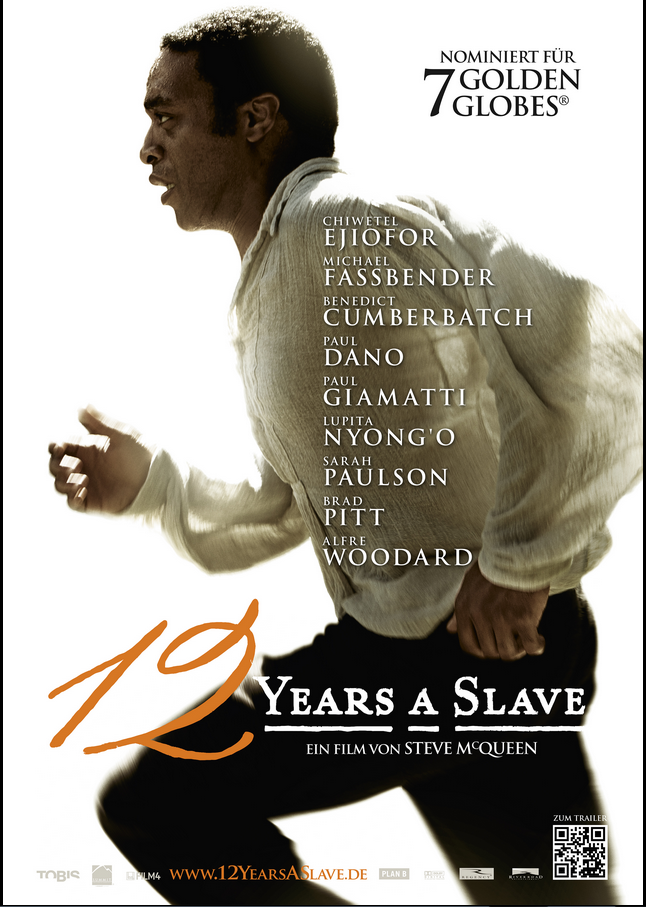
12 Years a Slave is a 2013 film directed by Steve McQueen (actually Steven Rodney McQueen, not to be confused with his famous namesake who died in 1980), British filmmaker, photographer and sculptor.

12 Años de Esclavitud es una película de 2013 dirigida por Steve McQueen (en realidad Steven Rodney McQueen, no confundir con su famoso homónimo fallecido en 1980), cineasta, fotógrafo y escultor británico.

Actually his career as a film director is not very proficient, in the last fifteen years he has directed only four films Hunger in 2008, Shame in 2011, the aforementioned award-winning 12 Years a Slave in 2013 and Widows in 2018
The film tells the true story of Solomon Northup (it is based on Solomon Northup's 1853 autobiography of the same name) and deals with the stigma of slavery a subject that has always attracted the attention of the Hollywood Academy, to the point of being nominated for nine Oscars and winning the Golden Globe for Best Dramatic Picture.
The list of actors is very solid and homogeneous, including Chiwetel Ejiofor in the lead role, while Michael Fassbender, Benedict Cumberbatch and Brad Pitt, among others, play supporting roles.
The film has several producers (seven to be exact) and one of them is Plan B Entertainment owned by Brad Pitt.

En realidad su carrera como director cinematográfico no es muy proficua, en los últimos quince años ha dirigido solo cuatro films Hunger en el 2008, Shame en el 2011, el mencionado y premiado 12 Años de Esclavitud en el 2013 y Viudas en el 2018
La película narra la historia verdadera de Solomon Northup (está basada en la autobiografía homónima de Solomon Northup de 1853) y trata el estigma de la esclavitud, un tema que siempre ha despertado la atención de la Academia de Hollywood, a punto tal de ser haber sido nominado a nueve premios Óscar y haber ganado el Globo de Oro a la mejor película dramática.
La lista de actores es muy sólida y homogénea, entre los que se destacan Chiwetel Ejiofor en el papel principal, mientras Michael Fassbender, Benedict Cumberbatch y Brad Pitt, entre otros, ocupan roles secundarios.
La película tiene varios productores (para ser exactos siete) y uno de ellos es Plan B Entertainment, de propiedad de Brad Pitt.

We are in the middle of the 19th century in the USA, before the Civil War, Solomon Northup, a talented black violinist, a respected man and father of a family in the liberal state of New York, lives free practicing his profession in the small town of Saratoga Springs (New York State) with his wife Anne and their children Margaret and Alonzo.
Let us remember that at that time the state of New York had a liberal pro-slavery administration (slavery disappeared definitively from the USA with the 13th amendment to the Constitution approved in 1865, after the end of the Civil War) exactly twenty-five years after the beginning of the events as narrated by its main protagonist.
Solomon, in a clear manifestation of racist apartheid, is first deceived (by two people pretending to be show business agents when in reality they are intermediaries looking for people to reduce them to slavery), kidnapped, beaten and mistreated later, deprived of his identity papers and his status as a free man and taken to Louisiana, a state with deep slavery convictions, where slaves were employed to work especially in cotton picking.
Under these conditions, Solomon Northup changes owners three times and remains for twelve years (hence the title of the film) until 1853 in conditions of slavery, suffering the mistreatment of the perfidious slave owner Edwin Epps and very rare and unexpected acts of kindness from other people who, while not daring to deny slavery, do not openly approve of it either, always and at all times trying not only to fight to survive, but also to preserve their dignity.
The turning point in the unjust situation he is going through is a chance meeting with Canadian abolitionist Samuel Base, to whom he tells his story, but asks him not to divulge it publicly for his own safety.
Bass begins to investigate the information Solomon has given him and discovers that it is all true, manages to locate Northup's family and uncovers the origin of the criminal fraud and blackmail to which Solomon has been subjected, and is able to regain his freedom and, above all, his status as a free man.
The film ends with Solomon returning home to embrace his wife and grown children.
Before the film's end credits, an overprint caption reports Solomon Northup's statements about his futile legal battle against his kidnappers.
His odyssey, like so many others that gradually began to see the light of day, served to accentuate the abolitionist commitment made in 1865.

Estamos en plena mitad del siglo XIX en los EE. UU., antes de la Guerra de Secesión, Solomon Northup, un talentoso violinista negro, un hombre respetado y padre de familia en el liberal estado de Nueva York, vive libre ejerciendo su profesión en la pequeña ciudad de Saratoga Springs (Estado de Nueva York) con su esposa Anne y sus hijos Margaret y Alonzo.
Recordemos que en ese momento el estado de Nueva York tenía una administración liberal pro-esclavismo (la esclavitud desaparece definitivamente de los EE. UU. con la 13 enmienda a la Constitución aprobada en 1865, una vez terminada la Guerra de Secesión) exactamente veinticinco años más tarde del inicio de los hechos según los narra su principal protagonista.
Solomon, en una clara manifestación de apartheid racista, es engañado primero (por dos personas que fingen ser agentes del mundo del espectáculo cuando en realidad son intermediarios buscando personas para reducirlas a la esclavitud), secuestrado, golpeado y maltratado más tarde, privado de sus documentos de identidad y de su condición de hombre libre y llevado hasta Luisiana, un estado con profundas convicciones esclavistas, donde los esclavos eran empleados para trabajar especialmente en la recolección del algodón.
En esas condiciones, Solomon Northup cambia tres veces de dueño y permanece durante doce años (de ahí el título de la película) hasta 1853 en condiciones de esclavitud, sufriendo los maltratos del pérfido esclavista Edwin Epps y muy raros e inesperados actos de bondad de otras personas que si bien no osan renegar de la esclavitud tampoco la aprueban abiertamente, tratando siempre y en todo momento no solo de luchar por sobrevivir, sino también por conservar su dignidad.
El punto de inflexión en la injusta situación por la que está atravesando es un encuentro casual con el abolicionista canadiense Samuel Base, a quien cuenta su historia, pero a su vez le pide especialmente que no la divulgue públicamente por su propia seguridad.
Bass comienza a indagar sobre los datos que le ha dado Solomon y descubre que todo es verdad, consigue localizar a la familia de Northup y descubrir el origen del criminal fraude y chantaje de que ha sido objeto Solomon, logrando que este recupere su libertad y sobre todo su condición de hombre libre.
La película termina con Solomon que, de regreso a su casa, abraza su mujer y sus hijos ya mayores.
Antes de los créditos finales de la película, una leyenda sobreimpresa informa sobre declaraciones de Solomon Northup donde da cuenta de su inútil batalla legal contra los secuestradores.
Su odisea como tantas otras que de a poco comenzaron a ver la luz sirvieron para acentuar el compromiso abolicionista concretado en 1865.

Chiwetel Ejiofor as Solomon Northup
Michael Fassbender as Edwin Epps
Brad Pitt as Samuel Bass
Benedict Cumberbatch as William Ford
Paul Dano as John Tibeats
Paul Giamatti as Theophilus Freeman
Lupita Nyong'o as Patsey
Alfre Woodard as Harriet Shaw
Sarah Paulson: Mary Epps

Chiwetel Ejiofor como Solomon Northup
Michael Fassbender como Edwin Epps
Benedict Cumberbatch como William Ford
Brad Pitt: Samuel Bass
Paul Dano como John Tibeats
Paul Giamatti como Theophilus Freeman
Lupita Nyong'o como Patsey
Alfre Woodard como Harriet Shaw
Sarah Paulson como Mary Epps

American cinema (although in this case the director is British) has always or almost always tried to assume a critical attitude against the monstrosity of slavery, the original sin of a nation that still has not managed to get rid of it, parallel if you will to the Indian genocide, to which it has not devoted the same attention although we can cite some isolated exponents in the isolated film world as Django Unchained by Quentin Tarantino and the distant The Last Adventure of 1966 with a great Robert Shaw in the role of General Custer.
However, the subject has already been addressed by other top directors (it is enough to remember Steven Spielberg's Amistad) slavery in the hands (or in the direction of cameras) Steve McQueen and even Quentin Tarantino, acquires another dimension, a hard, realistic, stark and even subversive vision that challenges the great empire of the North.
We can say that the characters are different, but the essence is the same, to some extent they are unusual, special slaves, who end up escaping the fate of their people for the same reason and whose actions are evidently intended to awaken the numb conscience of the viewer.
The film was nominated for nine Oscars, winning three of them, for Best Picture, Best Supporting Actress and Best Adapted Screenplay, BAFTA Award for Best Actor and numerous other awards from international critics.

El cine norteamericano (aunque en este caso el director es británico) ha tratado siempre o casi siempre de asumir una actitud crítica contra la monstruosidad de la esclavitud, el pecado original de una nación que todavía no ha logrado sacárselo de encima, paralelo si se quiere al genocidio indio, al cuál no le ha dedicado la misma atención aunque podemos citar aisladamente algunos exponentes en el mundo cinematográfico aislados como Django Unchained de Quentin Tarantino y la lejana La Ultima Aventura de 1966 con un estupendo Robert Shaw en el rol del general Custer.
No obstante, el tema ya ha sido abordado con otros directores de primer nivel (es suficiente recordar Amistad de Steven Spielberg) la esclavitud en las manos (o en la dirección de cámaras) Steve McQueen e incluso de Quentin Tarantino, adquiere otra dimensión, una visión dura, realista, descarnada y hasta subversiva que desafía al gran imperio del norte.
Podemos decir que los personajes son distintos, pero la esencia es la misma, en cierta medida son esclavos insólitos, especiales, que acaban escapando del destino de su pueblo por una misma razón y cuyo accionar evidentemente pretende despertar la conciencia adormecida del espectador.
La película fue nominada a nueve Premios Óscar, de los cuales obtuvo tres, a la Mejor Película, a la Mejor Actriz de Reparto y al Mejor Guion Adaptado, Premio BAFTA al Mejor Actor y otros numerosos premios de la crítica internacional especializada.

Crossposting / posteo cruzado.
Source images / Fuente de las imágenes: IMDB.
Thanks for reading!!! / Gracias por leer!!!
Fuentes de los separadores de texto / Source divider text:

